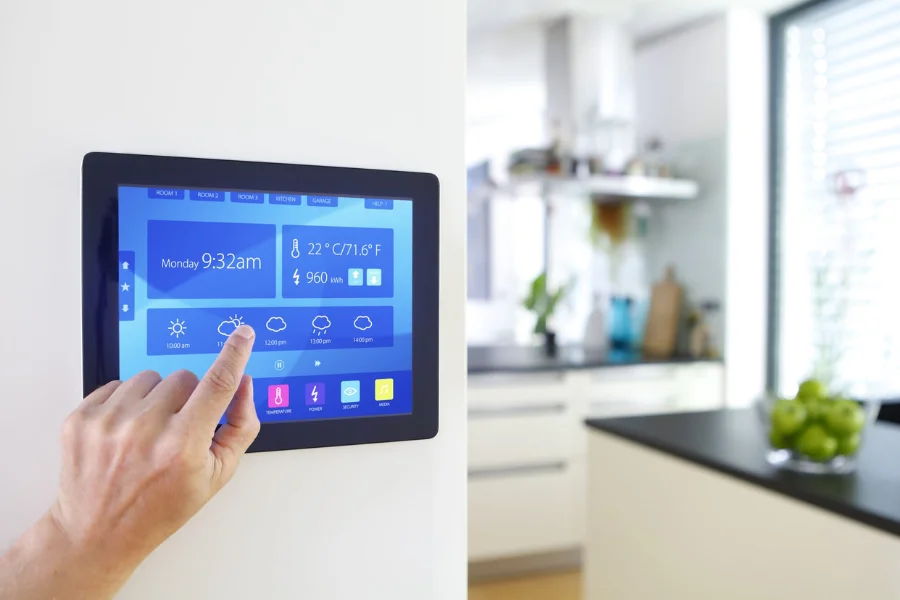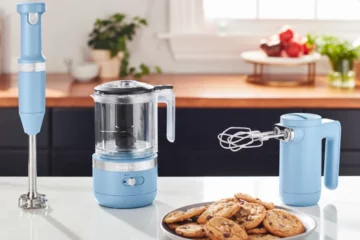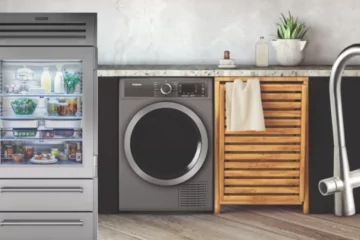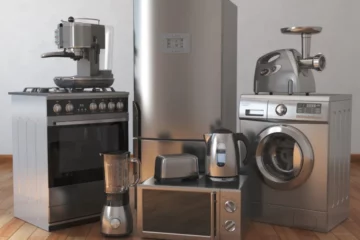Smart Home Appliances: The Future of Home Automation

Home Automation | Bebevy
The era of smart homes is upon us, and with it comes a range of innovative devices that have transformed the way we interact with our living spaces. Smart home appliances have become increasingly popular in recent years, offering homeowners a convenient and efficient way to manage their homes. From cutting-edge refrigerators that allow you to check the contents of your fridge from your phone, to smart thermostats that adjust the temperature to your liking, these devices are the future of home automation. With the rise of the Internet of Things (IoT), smart home appliances can now communicate with one another, making it possible for you to control your lights, security systems, and even your coffee maker with a single app. The possibilities are endless, and as technology continues to evolve, we can expect even more exciting developments in the world of smart home appliances. So, if you’re looking to upgrade your home and take your living experience to the next level, smart home appliances are definitely worth considering.
Advantages of using smart home appliances
Smart home appliances offer a range of advantages over traditional appliances. One of the main benefits is convenience. With smart home appliances, you can control your devices from anywhere in the world using your smartphone or tablet. This means you can turn on your air conditioning or heating before you get home, or adjust the temperature in your fridge while you’re at the grocery store.
Another advantage of smart home appliances is energy efficiency. Many smart appliances have built-in sensors that can detect when you’re not using them, and will automatically turn themselves off to save energy. This can lead to significant savings on your utility bills over time.
Smart home appliances also offer improved functionality. For example, a smart oven can be controlled remotely, allowing you to preheat it before you get home, or adjust the temperature from another room. Additionally, many smart appliances are connected to the internet, which means they can receive software updates and improve their functionality over time.
Overall, smart home appliances offer a range of benefits that can make your life easier, more convenient, and more energy-efficient.
The rise of smart home appliances in the market
Smart home appliances have become increasingly popular in recent years, with more and more consumers looking for ways to automate their homes. According to a report by ResearchAndMarkets.com, the global smart home appliances market is expected to grow at a CAGR of 13.8% over the next five years, reaching a value of $92.72 billion by 2025.
One of the main drivers of this growth is the increasing availability of affordable smart home appliances. In the past, smart home appliances were expensive and only accessible to a small number of consumers. However, as the technology has improved and become more widespread, the cost of these devices has decreased, making them more accessible to the average consumer.
Another factor driving the growth of the smart home appliances market is the increasing adoption of the Internet of Things (IoT). With more and more devices connected to the internet, it’s becoming easier for consumers to control and automate their homes using a single app.
Overall, the rise of smart home appliances in the market is a reflection of the growing demand for more convenient and efficient ways to manage our homes.
The technology behind smart home appliances
Smart home appliances rely on a range of technologies to function. One of the most important is the Internet of Things (IoT), which allows devices to communicate with one another over the internet. This means that your smart thermostat can talk to your smart lights, and your smart refrigerator can talk to your smart oven.
Another important technology used in smart home appliances is artificial intelligence (AI). Many smart appliances are equipped with AI-powered sensors that can detect changes in your home environment and adjust their settings accordingly. For example, a smart thermostat might learn your habits and automatically adjust the temperature based on your preferences.
Finally, smart home appliances use a range of connectivity technologies to communicate with other devices and with the internet. These technologies include Wi-Fi, Bluetooth, and Zigbee, among others.
Overall, the technology behind smart home appliances is complex, but it allows for a range of innovative features and functionality that can make our lives easier and more convenient.
Types of smart home appliances and their features
There are a wide range of smart home appliances available on the market today, each with their own unique features and functionality. Some of the most popular types of smart home appliances include:
- Smart thermostats: These devices allow you to control the temperature of your home remotely, and can learn your habits over time to automatically adjust the temperature to your liking.
- Smart lighting: Smart lighting systems allow you to control the lighting in your home using your smartphone or tablet. Some systems can even be programmed to turn on and off automatically based on your schedule.
- Smart refrigerators: These devices come equipped with cameras that allow you to see the contents of your fridge from your smartphone, so you can check what you need to buy while you’re at the grocery store.
- Smart ovens: Smart ovens allow you to control your oven remotely, so you can preheat it before you get home or adjust the temperature from another room.
- Smart security systems: These systems allow you to monitor your home remotely, and can send you alerts if there is any unusual activity.
These are just a few examples of the many types of smart home appliances available on the market today. Each device comes with its own unique features and functionality, making it easy to find the right device to suit your needs.
Smart home automation systems and how they work
Smart home automation systems are designed to make it easy to control all of your smart home appliances from a single app. These systems typically come with a hub that connects all of your devices to the internet, allowing you to control them from anywhere in the world using your smartphone or tablet.
One of the key features of smart home automation systems is the ability to create routines. For example, you could create a routine that turns off all of your lights and locks your doors when you leave the house, or a routine that turns on your coffee maker and starts heating up your oven when you wake up in the morning.
Smart home automation systems also allow you to set up rules and triggers. For example, you could set up a rule that turns on your air conditioning when the temperature in your home reaches a certain level, or a trigger that turns on your porch light when someone approaches your home.
Overall, smart home automation systems are designed to make it easy to control all of your smart home appliances, and to create customized routines and rules that suit your lifestyle.
Smart home security and privacy concerns
One of the main concerns with smart home appliances is security and privacy. With more and more devices connected to the internet, there is a risk that hackers could gain access to your personal information or even control your devices.
To address these concerns, many smart home appliance manufacturers have implemented security measures such as data encryption and two-factor authentication. Additionally, it’s important to regularly update your devices with the latest software updates to ensure that they are protected against the latest security threats.
Another concern with smart home appliances is privacy. With devices like smart cameras and microphones in our homes, it’s important to be aware of who has access to this data and how it is being used. It’s important to read the privacy policy for each device carefully and to understand what data is being collected and how it is being used.
Overall, while there are certainly security and privacy concerns with smart home appliances, these risks can be mitigated by taking appropriate precautions and being aware of the risks.
Integrating smart home appliances into your lifestyle
Integrating smart home appliances into your lifestyle is easy thanks to the range of apps and automation systems available. To get started, you’ll need to choose the devices that are right for you based on your needs and preferences.
Once you have your devices set up, you can start experimenting with different routines and rules to see what works best for you. For example, you might want to create a routine that turns on your coffee maker and starts heating up your oven when you wake up in the morning, or a rule that turns on your porch light when someone approaches your home.
It’s also important to take the time to learn about the features and functionality of your devices to ensure that you are making the most of them. Many smart home appliances come with user manuals or online tutorials that can help you get started.
Overall, integrating smart home appliances into your lifestyle is a process, but with a little bit of experimentation and some patience, you can create a customized smart home experience that suits your needs and preferences.
Top brands and products in the smart home appliance market
The smart home appliance market is highly competitive, with a range of brands and products vying for consumers’ attention. Some of the top brands in the market include:
- Google Nest: Google Nest offers a range of smart home appliances, including smart thermostats, smart speakers, and smart security systems.
- Amazon: Amazon offers a range of smart home appliances under its Alexa brand, including smart speakers, smart thermostats, and smart lighting systems.
- Samsung: Samsung offers a range of smart home appliances, including smart refrigerators, smart ovens, and smart washing machines.
- Philips Hue: Philips Hue is a popular smart lighting system that allows you to control the lighting in your home using your smartphone or tablet.
Overall, there are many top brands and products in the smart home appliance market, each with their own unique features and functionality. It’s important to do your research and choose the products that are right for you based on your needs and preferences.
Future predictions for smart home appliances
As technology continues to evolve, we can expect even more exciting developments in the world of smart home appliances. Some of the trends that we can expect to see in the future include:
- Continued growth of the smart home appliance market, with new and innovative products entering the market.
- Increased adoption of artificial intelligence (AI) and machine learning algorithms in smart home appliances, allowing them to learn and adapt to our habits and preferences.
- Greater integration between smart home appliances and other devices, such as wearable technology and smart cars.
- The development of more advanced automation systems that can create even more customized routines and rules.
Overall, the future of smart home appliances is bright, with endless possibilities for innovation and improvement.
Conclusion
Smart home appliances are the future of home automation, offering homeowners a convenient and efficient way to manage their homes. These devices offer a range of benefits, including convenience, energy efficiency, and improved functionality. With the rise of the Internet of Things (IoT), smart home appliances can now communicate with one another, making it possible for you to control your lights, security systems, and even your coffee maker with a single app. While there are certainly security and privacy concerns with smart home appliances, these risks can be mitigated by taking appropriate precautions and being aware of the risks. Overall, if you’re looking to upgrade your home and take your living experience to the next level, smart home appliances are definitely worth considering.








